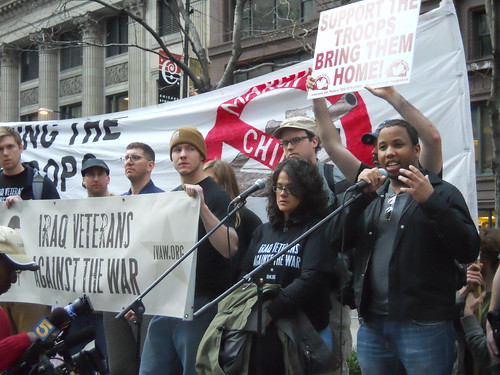| « Health Care Forum Highlights Debate Within the Left | Pete's Market and Workers Rights » |
The Left Sat Mar 20 2010
Reflections on Anniversary of the Invasion of Iraq
Every year around March 20th, I attend an anti-war rally. On March 17, 2010 over a thousand people rallied at Federal Plaza and marched on Michigan Ave. It came as President Obama is intensifying the war in Afghanistan. The protesters seemed to be mocking Mayor Daley's challenge, "Where are the anti-war people? They disappeared! They stopped marching!" No, we never did stop marching, even as Daley has continued to antagonize us.
It was March 20, 2003, seven years ago, that shock and awe began and our country invaded and began to occupy Iraq, the second largest source of oil in the world, a country with a civilization that dates back to before the bible was written. I was arrested that day at a protest, like 900 Chicagoans, and many more around the country were.
It was a scary time. Less than two years since 9/11, and it felt like the whole country was against the anti-war protesters. I had nightmares that I was thrown in Guantanamo Bay. Today, the majority of the country is against war in Iraq and most of the country has it's doubts about the war in Afghanistan.
I asked a friend if he was going to attend this year. He would rather apartment hunt. He asked me what difference going to the rally would make. Would it end the war? Would it stop the bloodshed? After we had such massive anti-war rallies before the invasion and those failed to stop it, what difference would this one rally seven years later, 95,000 dead Iraqis later, make?
I have to admit. Every year our numbers dwindle. Every year there are more 9/11 conspiracy nuts. Every year it seems that the war is in the headlines less.
Why do people go to church? Do they expect god to hear their prayers when he has been silent for so long? God has refused to answer their other prayers, would he listen to their choir? Would praying end the sinning and lead us to treat one another as we would want to be treated?
People go to church for other reasons than to throw their change in a wishing well. They go to network, and meet people with similar beliefs. People go to feel a part of something bigger and better than themselves. They go to find out when the soup kitchen meets, how to donate to homeless shelters. They go to admit their sins and lessen their guilt. Likewise me and these rallies.
I enjoy meeting old friends, chatting about who graduated, where we are working, who got married, what kind of organizing we're doing. I enjoy meeting new friends and realizing how much we have in common. Anti-war rallies bring together people from all walks of life: a blues singer with cancer who sells buttons at the rally; a soft-spoken and religious gay nursing student; a friend who realized he didn't want a 9-5 job the day he was introduced to the punk band the Dead Kennedys; the revolutionary who became a janitor to organize the working class; the mother who raised her children to enjoy comic books and activism instead of war; the veteran who asked Iraqis for forgiveness and in the process was called a hero by them; the subway musician who is recovering from being mugged; the college friend I first smoked pot with who is now a union electrician and brings his younger brother to rallies.
I enjoy finding out about the different projects that are happening in the city -- Marxist reading groups, Food Not Bombs servings, benefit concerts to stop evictions or in support of immigrants.
We gather once a year on remember our dead. We remember those who died in war, US soldiers, and the Iraqis, Afghanis, and Palestinians. We remember those members of the movement who died here at home, like historian Howard Zinn, dissident alderman Leon Despres, surrealist artist and publisher of Charles H. Kerr Press Franklin Rosemont.
The rally and march becomes a way to remind our neighbors in the city of them as much as it is a reminder of how much more we have to do to end the wars waged in our name.
The war has fallen off many people's agendas. Part of the problem, is that the anti-war movement has no clear base in this country. Unions have workers and their members, civil rights groups have minority groups, feminist groups have women, but who is the anti-war movement to organize? The war touches everything, from how police are trained, to the money spent on war instead of health care to the stripping away of civil liberties. However the war impacts the people in Iraq and Afghanistan most directly.
We could try to organize the military. The movie Sir, No Sir! showed how Coffee Shops near army bases helped turn soldiers against the war. Groups like Iraq Veterans Against the War have assisted soldiers who flee to Canada or who file Conscientious Objector status. There can also be attempts to stop the flow of youth into the military. Chicago is one of the most militarized school districts in the country, and groups like the Save Senn coalition have attempted to push military recruiters off campus and keep JROTC and military academies from preying on youth. It's bad enough many youth have gangs attempting to recruit them, but the military is the biggest gang of them all.














Damn the man / March 20, 2010 11:07 AM
No offense, I'm sure your stance is genuine. However most of the anti-war people seemed to oppose the idea of someone else's finger on the button.
Of course, all the "happenings"you detail are about as far outside the mainstream as one can get, right? Might as well get some truthers and birthers in there to round out the crazies.